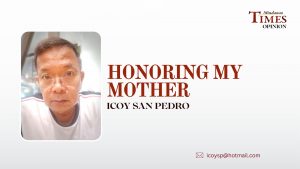BY HERMAN M. LAGON
IN A TIME when public image frequently takes precedence over public service, the latest incident involving Alice Guo, a highly concerning missing person, exposes a concerning pattern in the Philippine government. We saw a show that can only be called an embarrassing farce, not a serious reflection of justice and accountability. As high-ranking officials, such as Interior Secretary Benhur Abalos and Chief of the Philippine National Police Rommel Marbil, were pictured with Guo—who had just been captured in Indonesia—the controversy burst out. This incident has not only caused outrage but has also shown a troubling disengagement from professionalism and decency.
The off-putting images, which went viral on social media, show Guo, who is accused of having ties to criminal organizations and is facing severe accusations like human trafficking, grinning with government representatives. Seeing these dignitaries smiling with a wanted person is a national embarrassment. Sen. Risa Hontiveros correctly noted that this photo session with Guo is a stark reminder of priorities that are out of alignment and a moment of poor judgment. Guo, a wanted man dodging severe charges, was given unwarranted star treatment, which turned a criminal arrest into an odd photo op.
Critics have good reason to be furious. The sight of law enforcement personnel posing for selfies with Guo casts doubt on the objectivity of our institutions. The disturbing discrepancy between the ideals of justice and the deeds of those entrusted with upholding them drives the outrage, not just the photos themselves. The incident highlights a concerning reality: senior officials, including their minions, appear to be more focused on appearances than the seriousness of the situation.
This phenomenon symbolizes a larger problem with the government. The pictures’ carefree attitude, complete with smiles and peace signs, suggests that the seriousness of Guo’s alleged crimes is not taken seriously enough. The officials’ actions reveal an unsettling degree of disengagement from the duties and moral obligations of their positions, in contrast to the solemnity and resolve expected of public servants. The controversy was exacerbated by Guo’s apparent unrestrained behavior in spite of having two outstanding arrest warrants and being a prominent player in a well-publicized case. The officials’ joviality and her laid-back manner make for an unsettling contrast when considering her criminal charges. This inappropriate behavior erodes public confidence and calls into question the legitimacy of our legal system.
This is ironic. It was anticipated that Guo’s escape from prosecution and eventual apprehension would represent a win for the legal system and law enforcement. Rather, it has revealed a basic breakdown in upholding the gravity and decorum that these kinds of cases require. The emphasis should have been on upholding the rule of law and handling the legal ramifications of her case. Rather than a formal legal proceeding, the public was treated to a show that resembled a publicity stunt.
The public is not particularly relieved by the officials’ response, especially their attempt to defend the photos as merely recording the apprehension. It is hard to understand how a professional or appropriate gesture would be interpreted as a smiling photo op with a wanted person. The attempt to portray it as mere evidence of capture only emphasizes their alarming ignorance of the consequences and appearance of their actions.
This episode is a sobering reminder of how frequently the wealthy and powerful avoid accountability, leaving the general public to deal with the consequences. Guo received fanfare when she was welcomed, but this is just one example of a worrying trend in which the powerful are treated preferentially. At the same time, common people suffer the consequences on the social and legal fronts. It confirms the sad common belief that the wealthy and influential frequently face different laws.
Furthermore, this show highlights a severe moral and ethical failure in handling high-profile cases. Such smug attitudes from those in positions of authority undermine public confidence in the institutions designed to safeguard and assist the people. Rather than fostering an atmosphere in which fugitives are accorded undue reverence, the emphasis should be accountability and justice.
There have been many occasions throughout our history when the actions of its leaders have drawn criticism. This case adds a new chapter to that story, showing how much work remains to be done to make sure that our leaders uphold the values of justice, integrity, and professionalism. Such incidents must be addressed, not just with words of regret but also with tangible steps that reestablish public trust and show a commitment to moral leadership.
Ultimately, this controversy highlights how urgently our public institutions need to reevaluate their core principles. Preventing such mistakes from becoming the norm is just as important as avoiding the embarrassment of the moment. Leaders who treat people with respect and gravity are especially needed regarding justice and public confidence issues. All parties involved should take this as a wake-up call to recommit to the values of professionalism and integrity in light of the Alice Guo selfie scandal.
As we proceed, we must demand better from those in positions of authority and power. The public’s response to this incident is indicative of a larger desire for transparency and deference to the law. Now, the task is to turn this indignation into substantive reform and ensure that such a hideous demonstration of misguided priorities never occurs again. Such deplorable displays have no place in the field of public service.
***
Doc H fondly describes himself as a ”student of and for life” who, like many others, aspires to a life-giving and why-driven world grounded in social justice and the pursuit of happiness. His views do not necessarily reflect those of the institutions he is employed or connected with.



